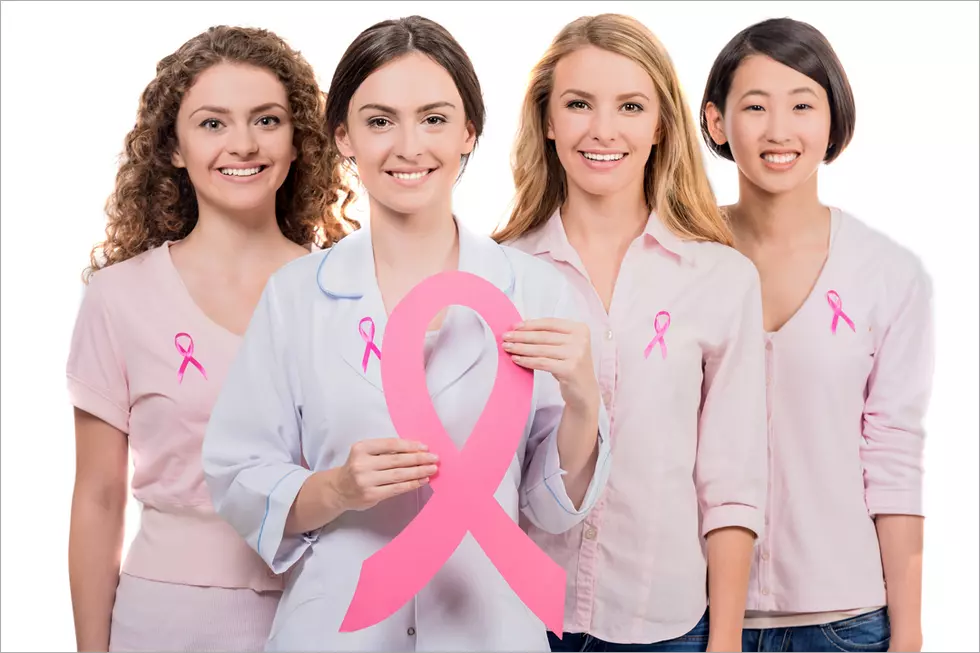
Knowing the signs and symptoms of breast cancer could save many lives in New Jersey
October is Breast Cancer Awareness Month but a reason this type of cancer has a designated month is to help spread awareness and begin or continue the conversation on going for mammograms, going for checkups, learning more about it, and getting to treating it as early as possible.
It's important year-round to have the same conversation brought up in October so that women and men can do what they can to lower their risk of getting breast cancer and know what to do right away if something feels or seems off.
For an explanation of some of the need-to-know information, Dr. Roshani Patel, the Medical Director of Breast Surgery at Jersey Shore University Medical Center where she performs surgery and also has an office there at HOPE Tower and outside the hospital in Neptune City in Toms River and Jackson, joined us to share what you need to know.
Dr. Patel also has an extensive background and is one of the top doctors in the area after coming to JSUMC from being a breast surgical oncologist at Dartmouth-Hitchcock Medical Center in New Hampshire, an instructor in surgery at the Geisel School of Medicine at Dartmouth College, and served as the New Hampshire State Chair for the American College of Surgeons Commission on Cancer.
What is the prevalence of breast cancer in the United States and/or New Jersey with the rates, cases, and awareness?
"One-in-Eight women in the United States develop breast cancer, so about 12.5-percent," Dr. Patel said.
How much did the Covid-19 pandemic affect the diagnoses of reported breast cancer cases and/or people not getting regular checkups?
"I think what's happened is that we're seeing patients with larger cancers that were untreated for fear of coming in for mammograms and unfortunately, in the early stages of the Covid pandemic, a lot of imaging centers were closed to routine screenings," Dr. Patel said. "A screening test means just looking to see if there's a problem. So, we are seeing patients in later stages and a lot of these imaging centers are trying to catch up from the backlog that they have, so, sometimes you're seeing delays because of that as well."
It's also created delays in getting in for appointments and getting results as well.
"As far as workups are concerned, meaning that they may see something but they can't schedule a biopsy for several weeks out for a patient -- this sometimes can create some problems as well," Dr. Patel said.
What are the early, possible signs of a breast cancer diagnosis? Is it more than just a lump or series of lumps?
"What I tell patients is that if you notice any focal pain that is not going away if you notice any lump that's new and is growing -- please get it checked out," Dr. Patel said. "Sometimes just a little bit of a dimple in the skin or nipple retraction, some patients will note fluid that's leaking from the nipple as well and if it's continuous and not due to pressure of the nipple, they should always get that checked out."
How important is it for men to speak up and say something if they feel that something is off or they're experiencing a symptom or symptoms of breast cancer?
"Men should speak up," Dr. Patel said.
She said that about 1 in 1,000 men, on average, are diagnosed with breast cancer so men should get checked out, especially if there's a family history of this cancer.
"The reason is, a lot of times they'll notice a lump but then it keeps growing and they're not thinking 'I have breast cancer, it's something else', so they don't seek treatment early enough and, unfortunately, sometimes they're diagnosed when it's much larger or if it has spread somewhere else in the body," Dr. Patel said.
How important is it to be able to get some answers that early and get screened and once people find out it is breast cancer, what are the next steps?
"If we find something on a screening exam, we will biopsy, usually using a tiny needle, the area is numbed up first, we'll biopsy a sample of the area," Dr. Patel said. "The reason it's important for early detection is that our treatment strategies are no longer one-size-fits-all. What we're finding is that a lot of times, if patients have a cancer that is detected early, it requires less treatment and that means there's going to be less cost to the patient and there's going to be less treatment side effects."
What are the different types of treatment for breast cancer?
"Surgically, if the cancer is caught early, a lot of times we can perform a lumpectomy, which is just removing the cancer and a healthy room of breast tissue," Dr. Patel said. "I like to give the example of an egg with the yolk being the cancer and the white is a healthy breast tissue, so we like to remove that and have a good margin of healthy tissue around it. A lot of times, if it's small enough, we can create incisions and remove a smaller amount of breast tissue without causing any cosmetic change for the patient."
Dr. Patel said another option depending on where the cancer is, is a mastectomy.
"Sometimes, that means, we're removing the breast if the patient has a larger cancer or larger volume of cancer in their breast, sometimes we have to consider a mastectomy and reconstruction," Dr. Patel said.
There is another part to know as well, depending on the progression of cancer.
"The other issue is lymph nodes, these are kidney bean shaped structures under the arm. We have them all over the body, it's part of the body's defense system, and what the lymph nodes do is typically fight off infection," Dr. Patel said. "Unfortunately, this can be the first sight of spread for cancer, so, what happens is the cancer has spread to the lymph nodes under the arms and it's pretty bad, and a lot of times we have to remove those and that can cause some arm pain, swelling, and other side effects."
The other part of the treatment for breast cancer is one more commonly known, and that's radiation.
"If somebody is having a lumpectomy, we offer radiation, that does not cause hair to fall out or any nausea or anything, it's kind of like sitting in a tanning bed for five minutes but a little bit more intense, and the radiation beams are primarily targeted toward the area where the cancer is," Dr. Patel said. "We sometimes have to offer radiation is somebody has to have a mastectomy, if it's a very advanced cancer, because the goal is to prevent the cancer from coming back."
There are certain medications offered as treatment as well to people with breast cancer.
"The medications are what scare people the most. A lot of times people will come in and say 'do I need chemotherapy?' and that's not necessarily the case. Chemotherapy is what can cause hair to fall out, some of the nausea and vomiting that we see, that people complain about, sometimes some of the medication can cause numbness and tingling as well but those side effects usually resolve," Dr. Patel said. "Irregardless, it's not a fun process to go through."
If someone is diagnosed with breast cancer, what should they do from a diet and exercise standpoint?
"I recommend that my patients exercise 115-minutes a week, moderate exercise, so, it can be as simple as walking 30-minutes a day or finding some type of activity that enjoy doing, for 30-minutes a day," Dr. Patel said. "Moderate means that you're out of breath but you can still carry on a conversation. 75-minutes a week is the other option but that would be intense exercise, maybe running or using an elliptical machine where you're out of breath but you can't really carry a conversation. The other pieces that are important, especially for post menopausal women, is strength training, we recommend that 1-2 times a week. I also recommend to our patients to stretch and that's important because it prevents injury."
From a diet standpoint, it's important to eat the right and healthy foods.
"There are a lot of studies that look at eating a low-fat diet and didn't really find any benefit and what we're finding is eating a heart healthy diet is just as important for patients to prevent cancer in addition to improving outcomes in patients who have cancer," Dr. Patel said. "What that balanced diet means is 25-percent grains, 25-percent protein, 15-percent fruit and 35-percent vegetables. Women should minimize added sugars -- so, when I talk about added sugar, if I add a teaspoon of sugar to a bowl of fruit, that added sugar is one teaspoon, so we have to read food labels carefully. Avoid artificial sweeteners and minimize saturated fats."
If a woman who is pregnant is diagnosed with breast cancer, what should they do?
"That requires a large team of people to follow them, not only the doctor that will eventually perform the surgery, but they should be followed by an OBGYN very closely to monitor the baby," Dr. Patel said. "We know that in certain stages of pregnancy, it's safe to give chemotherapy, so if they have a more aggressive cancer in their second and third-trimester, we typically will treat with chemotherapy up front, whereas we'll consider surgery early on or it can be considered during any stages of pregnancy. Radiation is not safe during pregnancy so depending on when in pregnancy, the patient develops cancer, that will affect the direction of treatments."
When is someone in remission, what are the signs of being cancer-free?
"A lot of it, for me being a surgeon, is monitoring their mammograms, they have a clinical exam every six months for the first two years and then guidelines say yearly exams," Dr. Patel said. "Our guidelines from the American College of Radiology and the National Cancer Guidelines suggest after they've had a lumpectomy, that they still continue with their mammograms once a year but those guidelines vary depending on how compliant patients are with treatment and what kind of cancer they had. The other thing we will always do is check with patients, are they having any bone pain, any dizziness, fainting, any other symptoms that would typically prompt us to order additional imaging."
What are some things people can do to prevent or lower the risk of getting breast cancer?
"The healthy lifestyles are important, but it is important to know family history, and I think talking and starting fresh with their primary care doctors and talking about their concerns. Sometimes, the primary care doctors refer the patients to a breast specialist or somebody who specializes in cancer genetics -- meaning they have a strong family history -- so it's recommended that they see somebody who's a specialist."
You can listen to the full conversation with Dr. Roshani Patel, right here.
First Responders Appreciation
New Jersey's Missing Children
How Firefighters training helped put out major fires
More From 94.3 The Point










